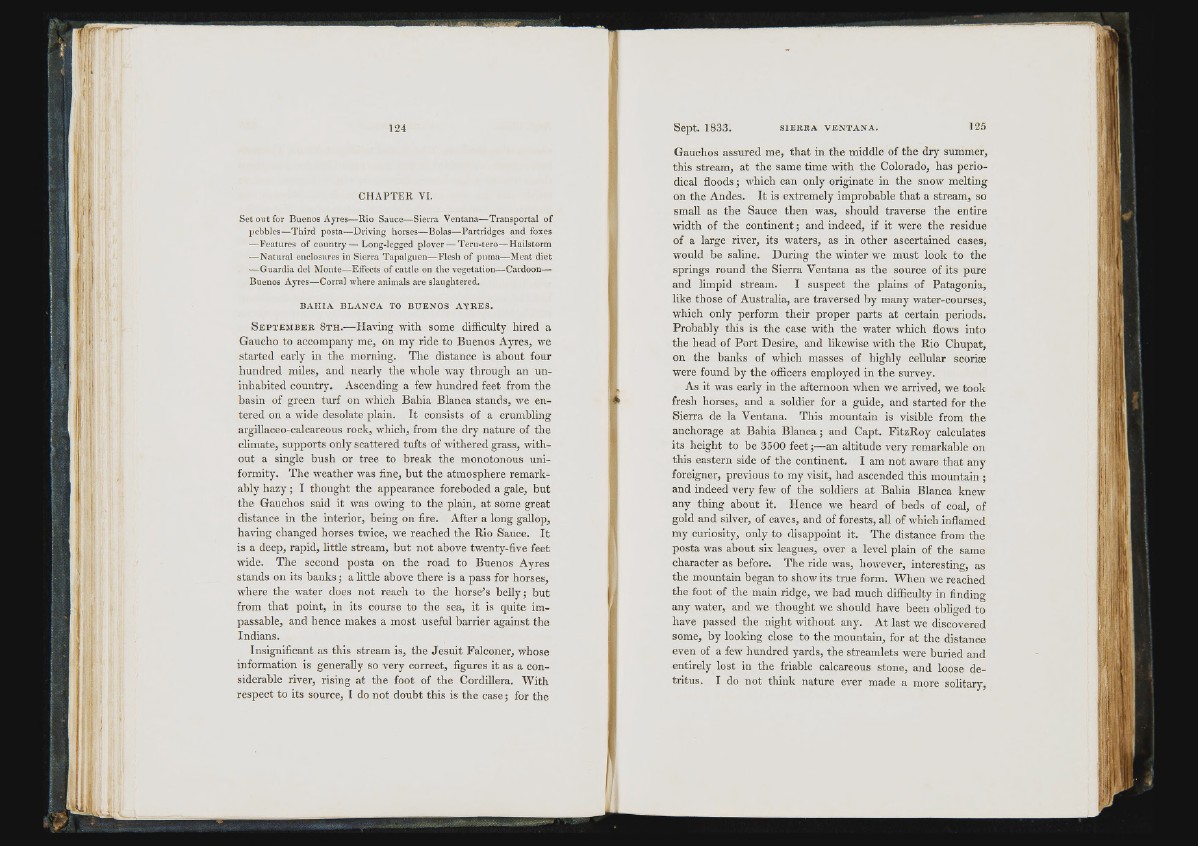
in
124
C H A P T E R V I.
S e t o u t fo r B u e n o s A y re s— R io S a u c e— S ie rr a V e n ta n a— T r a n s p o r ta l o f
p e b b le s— T h i rd p o s ta— D r iv in g h o rse s— B o la s— P a r tr id g e s a n d fo x es
— F e a tu r e s o f c o u n t r y— L o n g -le g g e d p lo v e r — T e r u - te ro— H a ils to rm
— N a tu r a l e n c lo su re s in S ie rr a T a p a lg u e n— F le sh o f p um a— M e a t d i e t
— G u a rd ia d e l M o n te— E ffe c ts o f c a ttle o n th e v e g e ta tio n— C a rd o o n—
B u e n o s A y r e s— C o r r a l w h e re a n im a ls a r e s la u g h te re d .
B A K IA B L A N C A TO BU EN O S A Y R E S .
S e p t e m b e r 8 t h .—Having with some difficulty hired a
Gaucho to accompany me, on my ride to Buenos Ayres, we
started early in the morning. The distance is about four
hundred miles, and nearly the whole way through an uninhabited
country. Ascending a few hundred feet from the
basin of green turf on which Bahia Blanca stands, we entered
on a wide desolate plain. It consists of a crumbling
argillaceo-calcareous rock, which, from the dry nature of the
climate, supports only scattered tufts of withered grass, without
a single bush or tree to break the monotonous uniformity.
The weather was fine, but the atmosphere remarkably
ha zy ; I thought the appearance foreboded a gale, but
the Gauchos said it was owing to the plain, at some great
distance in the interior, being on fire. After a long gallop,
having changed horses twice, we reached the Rio Sauce. It
is a deep, rapid, little stream, but not above twenty-five feet
wide. The second posta on the road to Buenos Ayres
stands on its banks; a little above there, is a pass for horses,
where the water does not reach to the horse’s belly; but
from that point, in its course to the sea, it is quite impassable,
and hence makes a most useful barrier against the
Indians.
Insignificant as this stream is, the Jesuit Falconer, whose
information is generally so very correct, figures it as a considerable
river, rising at the foot of the Cordillera. With
respect to its source, I do not doubt this is the case; for the
Sept. 1833. S IE R R A V E N T A N A . 12.5
Gauchos assured me, that in the middle of the dry summer,
this stream, at the same time with the Colorado, has periodical
floods; which can only originate in the snow melting
on the Andes. It is extremely improbable that a stream, so
small as the Sauce then was, should traverse the entire
width of the continent; and indeed, if it were the residue
of a large river, its waters, as in other ascertained cases,
would be saline. During the winter we must look to the
springs round the Sierra Ventana as the source of its pure
and limpid stream. I suspect the plains of Patagonia,
like those of Australia, are traversed by many water-courses,
which only perform their proper parts at certain periods.
Probably this is the case with the water which flows into
the head of Port Desire, and likewise with the Rio Chupat,
on the hanks of which masses of highly cellular scoriee
were found by the officers employed in the survey.
As it was early in the afternoon when we arrived, we took
fresh horses, and a soldier for a guide, and started for the
Sierra de la Ventana. This mountain is visible from the
anchorage at Bahia Blanca; and Capt. FitzRoy calculates
its height to be 3500 fe e t;—an altitude very remarkable on
this eastern side of the continent. I am not aware that any
foreigner, previous to my visit, had ascended this mountain ;
and indeed very few of the soldiers at Bahia Blanca knew
any thing about it. Hence we heard of beds of coal, of
gold and silver, of caves, and of forests, all of which inflamed
my curiosity, only to disappoint it. The distance from the
posta was about six leagues, over a level plain of the same
character as before. The ride was, however, interesting, as
the mountain began to show its true form. When we reached
the foot of the main ridge, we had much difficulty in finding
any water, and we thought we should have been obliged to
have passed the night without any. At last we discovered
some, by looking close to the mountain, for at the distance
even of a few hundred yards, the streamlets were buried and
entirely lost in the friable calcareous stone, and loose detritus.
I do not think nature ever made a more solitary.